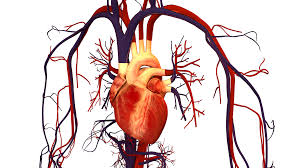
By Mark Zopfie, M.D.
That the circulation is responsible, or is the direct cause of a great many disturbances in the human body, is not generally observed or considered. This physiological function acts as an important factor, either for health or disease.
Diseases in which the circulation is involved are usually considered as heart lesions, as weak heart, etc. Speaking from past experiences I find that the circulation forms a distinct and separate field of pathology, independent of the heart. On the contrary, the heart lesions are rather the results of the circulation, as well as many other disturbances that are attributed to the heart, or some other organ or tissue. Instead of a weak and feeble circulation being caused by a weak heart, I find that this condition is the result of a very atonic and relaxed state of the whole nervous system. The vascular nervous system being too weak to control or keep the blood in circulation, thereby permitting an extreme upward pressure of blood to the heart and center of the body. As a result of this relaxed state of the nervous system and blood pressure, the heart secondarily becomes exhausted in the effort to keep this fluid in motion. Again, owing to this relaxation of the nervous system, we have a violent internal congestion, the large blood vessels, lungs, liver, spleen, stomach become engorged with stagnant blood, and in this condition these organs create new disturbances by their increased weight and pressure upon the nervous system, also by the depressed physiological function of these organs. It is this relaxation and congestion that forms the real pathology, and acts as an obstruction to the heart or circulation of blood.
It is this relaxation and congestion, also blood pressure to the heart, that is the cause of so many heart failures and sudden deaths. It is this relaxation of the nervous system that should receive treatment and not the heart, to establish a perfect and harmonious circulation, and thereby remove or cure some secondary disturbance that is the result of this congestion, as I shall attempt to demonstrate. So obstinate are these conditions that unless the circulation and nervous system is treated independent of the heart very little of a permanent nature is accomplished. Treat the circulation with such remedies as will gravitate the blood out through the entire body, and at the same time tone up the nervous system, that it may regain control of the circulation, assist the heart to accomplish or regain what it has lost. There cannot be a weak heart and a strong nervous system, or vice versa. The vital forces equalize themselves all over, and do not accumulate in one place more than another.
And when the circulation is involved the whole nervous system is at fault. Disturbances that I know to be the result of a faulty or deficient circulation are numerous, and in the diagnosis and treatment of diseases this field of pathology should receive very careful attention, as a great many nervous disturbances are the direct results of irritation or pressure from congested organs.
Disturbances that I know are caused by a deficient circulation are: Asthma, chronic bronchitis, epilepsy, apoplexy, haemoptysis and many others, as weak heart, etc.
To demonstrate my assertion I will call your attention to those most common and obstinate disturbances, asthma and chronic bronchitis. These two diseases are the result of a chronic congestion of lower lobes of both lungs, liver, spleen, stomach and kidneys. These organs in their engorged and swollen state become very much enlarged and increase in weight and pressure. By their increased weight the liver, spleen and stomach create a violent tension upon the diaphragm and pneumogastric nerves. And as the diaphragm is one of the organs of respiration, it will be easily seen how this organ becomes affected by this continued tension, also how the spasmodic or contracting condition of the pneumogastric nerves is produced. This I find is the philosophy of asthma, not of the bronchial tubes which are supposed to be the principal seat of irritation. The bronchial tubes become irritated, due to this chronic congestion and the excessive formation of mucus.
This may seem strange pathology to many, but I have demonstrated this to my own satisfaction at the bedside of many of this class of patients. In other words, I experience no difficulty to permanently overcome these diseases, when I treat them from this standpoint of pathology.
Relieve these organs of their engorged and congested state, start the blood into circulation and you will cure your asthmatics without any difficulty. And you will positively fail if only the secondary effects of these diseases are treated, i. e., the labored breathing, cough, expectoration, etc.
So obstinate is this mechanical tension upon the diaphragm and pneumogastric nerves that a permanent relaxation is impossible unless these organs are relieved of their engorged condition. To demonstrate that the above named disturbances are the results of a defective or deficient circulation are:
1st. That perpendicular position of the patient favors the circulation of blood by force of gravity, favors respiration and relieves some of the suffering and agony of the patient.
2d. A horizontal position of patient has just the opposite effect, decreases the circulation and increases congestion. Hence, a patient suffering from asthma cannot lie down, owing to this increased weight and pressure produced by the decreased circulation.
3d. The same effect is produced by motion or exertion, or any kind of nervous strain that will arouse the enfeebled circulation.
4th. Food during the process of digestion will increase this congestion and greatly aggravate the patient.
The anaemic and bloodless appearance of this class of patients is another indication of an external anaemia and internal congestion. Epilepsy is another disease of a faulty circulation, and is the result when from some slight cause the atonic vascular system loses control of the circulation, and this is followed by a violent blood pressure upon the brain and nervous system. Hence, the spasmodic condition which follows as a result of this pressure upon the brain.
Apoplexy is another disturbance of the same nature and character.
These and many other disturbances are diseases of the circulation.
Another most important feature in connection with these old and chronic cases is the blood. The blood assumes a very abnormal condition, becoming too thick, cold and very sluggish, and is in a very sub oxidized state. The truth is, that the blood develops into such abnormal condition that capillary circulation is almost impossible. The consequence is that the blood remains in the larger arteries and does not reach the surface of the body and lungs for oxidation. Consequently nutrition is interfered with, as is characteristic of most all these cases.
This morbid condition is one of the principal features for treatment in order to establish a better circulation and bring about a much needed reaction. The blood must be liquified and thermalized. The circulation and nervous system must be treatment to rapidly obtain the desired object. The function of liver, stomach, bowels and kidneys must receive attention, as in this condition those organs are usually very inactive, especially so the liver. The circulation and nervous system should receive treatment simultaneously to rapidly gain control of the circulation.
The circulation I treat with some of the following remedies: Aconite, Belladonna, Arsenicum, Bryonia, Phosphorus, Eryngiumaquat., Sanguinaria, Carbo veg., etc.
The nervous system with Gelsemium, Ignatia, China, Chamomilla, Cocculus, Spigelia, Phosphorus, Taurin, Kali phos., Mag. Phos.
To contract the dilated bloodvessels and assist circulation: Ham., Puls., Carbo., Zinc., Calc. flour., Flouric acid.
To liquify thickened blood: Argent. Nit., Sulph.
To thermalize the same and bring about a reaction: Capsi.
In some cases the blood is very watery and anaemic; this, of course, needs different treatment.
But in all cases is present this congestion and deficient circulation; also the extreme atonic and relaxed state of the whole nervous system.




